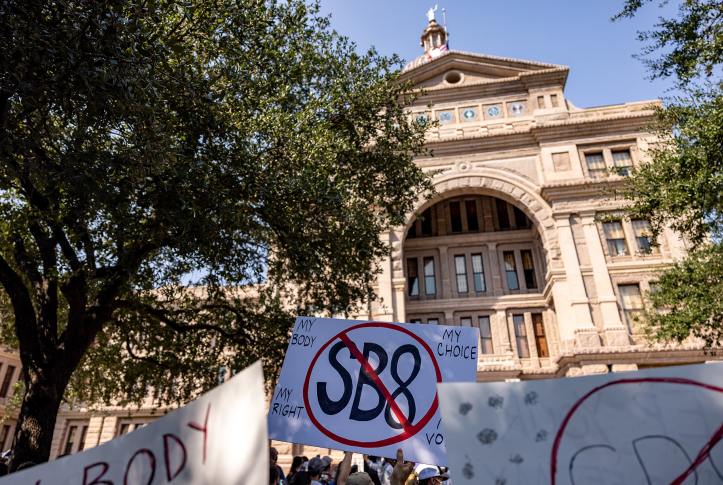The Supreme Court has for decades held that the Constitution does not allow states to prohibit abortions prior to fetal viability. For well over a century, federal courts have allowed lawsuits to block state officials from enforcing unconstitutional state laws. Texas carefully crafted Senate Bill 8 (S.B. 8) — which bans abortions after six weeks, long before viability — to evade attempts to block it in federal court.
Two recent court decisions, Whole Women’s Health v. Jackson from the Supreme Court and Van Stean v. Texas Right to Life from a lower Texas court, put a small dent in the Texas antiabortion law, but it remains in place, with abortions unavailable in Texas after six weeks.
In Dobbs v. Jackson Women’s Health Organization, the Supreme Court is now considering the constitutionality of a Mississippi law that bans abortions after 15 weeks. Because 15 weeks is also pre-viability, to uphold the law the Supreme Court must either overrule or limit the long-standing precedents in Roe v. Wade and Planned Parenthood v. Casey. From the oral arguments heard on December 1, it seems likely that a number — possibly a majority — of the Court’s members are willing to do this. But the Dobbs decision will likely not be released until the end of the term. In the meantime, S.B. 8 continues to violate the rights laid down in Roe and Casey, but there does not seem to be a way to invalidate it. Texas may be hoping to run out the clock in the expectation that the Court will overrule Roe and Casey.
S.B. 8 prohibits an abortion if a so-called fetal heartbeat is present, at about six weeks. The prohibition is not enforced by the state; rather, anyone can sue an individual who performs or knowingly “aids and abets” an abortion (e.g., medical providers, family members, friends) after a heartbeat is detected. There are severe consequences: an injunction, a minimum of $10,000 in damages, and attorney’s fees. Because of these consequences, abortion providers in Texas have stopped offering abortions after six weeks.
Two federal lawsuits and several state court lawsuits were filed in late summer to challenge S.B. 8. Although a federal district court judge issued a temporary order blocking the law in a case brought by the U.S. Justice Department and refused a request to dismiss Whole Women’s Health, brought by abortion providers and advocates, the Fifth Circuit Court of Appeals kept S.B. 8 in force in both cases and the Supreme Court refused immediately to intervene. The Supreme Court agreed to hear both cases quickly.
The Supreme Court Opinion
Justice Gorsuch wrote for the Court in Whole Women’s Health, joined for the most part by the four other conservative justices. The Court did not address the legality of the abortion ban itself, an issue that may well be settled by the Mississippi decision, but instead addressed the constitutionality of the way S.B. 8 is enforced.
States cannot be sued directly in federal court, but state officials who enforce unconstitutional laws can. S.B. 8 depends on private individuals for enforcement. In Whole Women’s Health, abortion providers and advocates sued Texas state court judges, court clerks, the Texas attorney general, and state licensure boards, as well as a private individual. Justice Gorsuch held that only the state licensure boards could be sued, as they were the only state officials who directly enforced the law.
Chief Justice Roberts, dissenting, also would have allowed the suit against court clerks and attorney general. Justice Sotomayor, who dissented separately, would have in addition allowed the suit against state court judges. She noted that the law was intentionally designed to evade federal judicial review and that the state enforcement procedures were designed to maximize harassment and minimize an opportunity to defend. The decision, she concluded, “leaves all manner of constitutional rights more vulnerable than ever before to the great detriment of our Constitution and our Republic.”
The Court sent the case back to the Fifth Circuit. But even if abortion providers can sue to protect their licenses, they cannot block private lawsuits in federal court, the primary threat.
In a separate decision, the Court rejected a U.S. Justice Department request to uphold a preliminary district court injunction against S.B. 8. The Court dismissed the Justice Department appeal, leaving the case with the Fifth Circuit, which has blocked the injunction for now.
The Texas State Court Decision
In Van Stean, 14 abortion providers sued specific private individuals and organizations to block them from bringing S.B. 8 lawsuits. The cases were combined before Judge David Peeples, a Travis County (Austin) district court judge.
Judge Peeples did not hold that S.B. 8’s abortion restrictions violate the Texas Constitution. He did hold that the provisions of S.B. 8 that permit private lawsuits for damages violate the Texas and U.S. Constitutions. He refused to block enforcement of the law, however, until further issues are determined. His decision does not bind other Texas courts or cover other provisions of S.B. 8.
In the meantime, Texas seems to have found a way around the United States Constitution and federal courts. Other states may follow its lead in limiting rights. California is already considering a law along the model of S.B. 8 to allow private suits against manufacturers or sellers of assault weapons or “ghost guns.” Texas and the Supreme Court may have opened a Pandora’s box, and what emerges may not please S.B. 8’s advocates.

